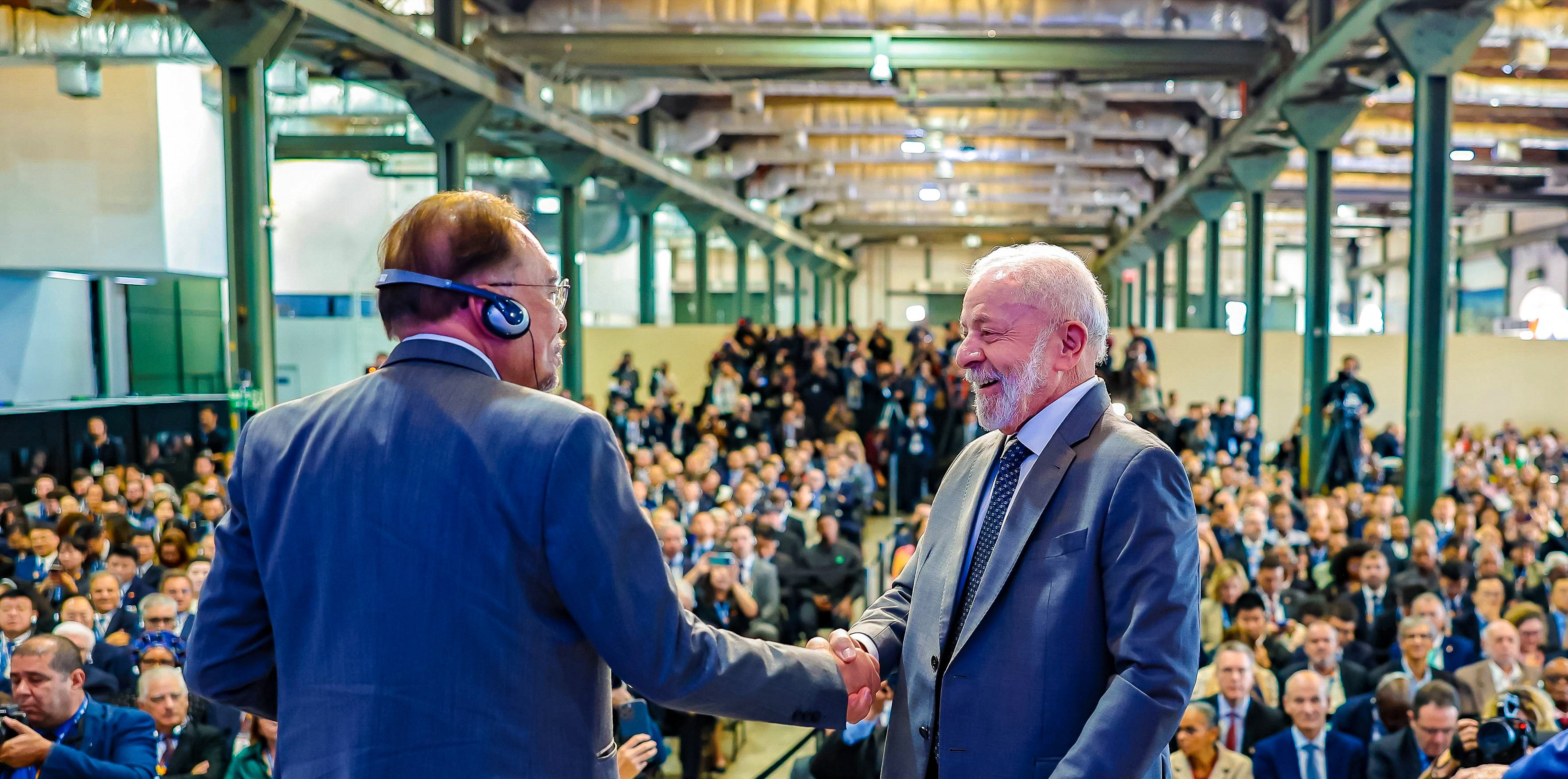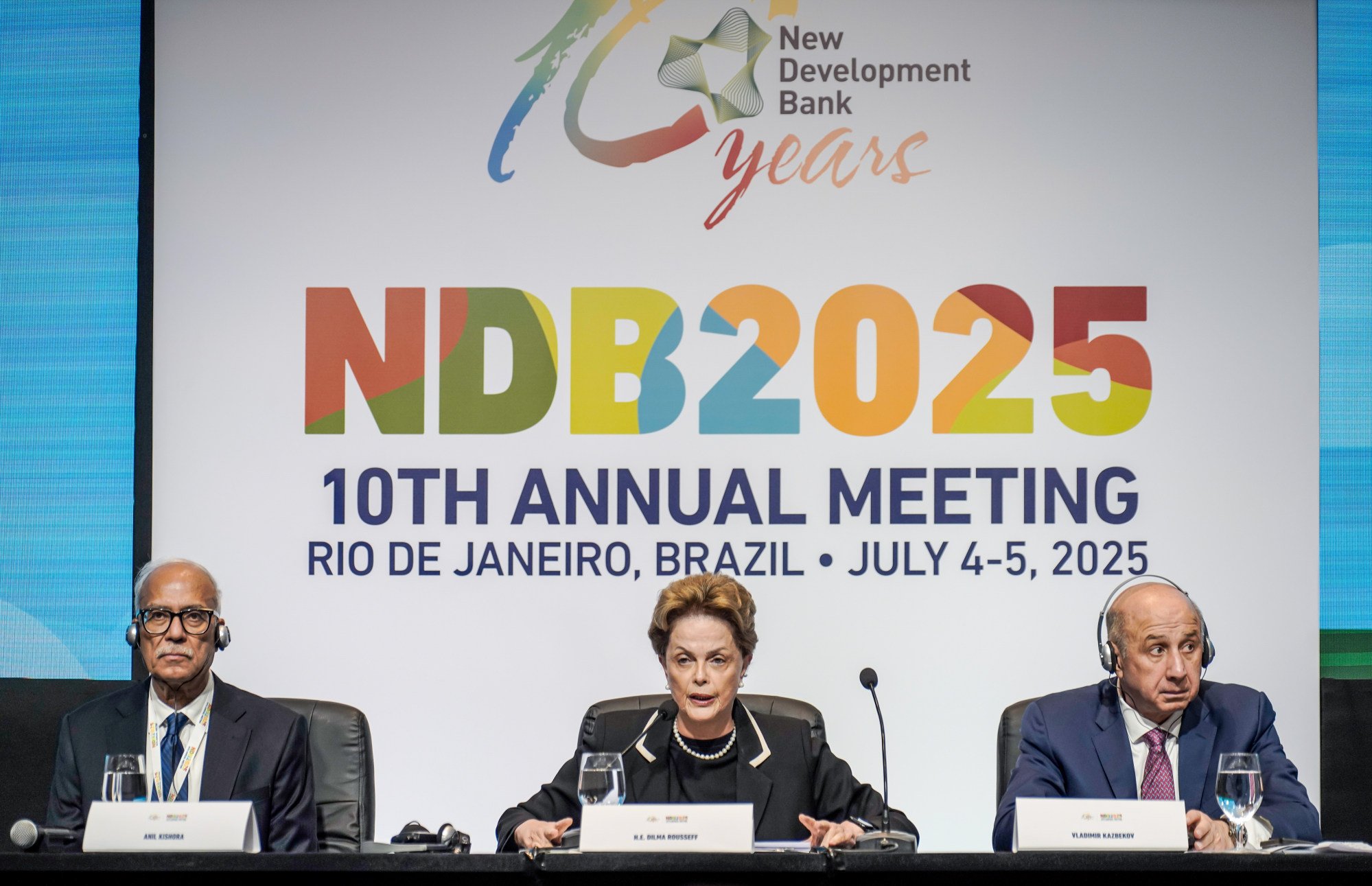Brics leaders urge cohesion, trade and use of local currency to grow clout
At Brics business forum, Malaysia’s Anwar Ibrahim calls on emerging markets bloc to learn from Asean to challenge Western dominance

Brics leaders have called for stronger cohesion, expanded trade and increased use of local currency to improve the Global South’s clout as an alternative to Western power, even as the bloc of emerging markets maintains ties and partnerships with wealthier countries.
As two new members joined the New Development Bank, also known as the “Brics bank”, Malaysian Prime Minister Anwar Ibrahim told business leaders and investors on Saturday that this delicate balancing act and bid for greater momentum would be helped by stronger ties between Brics and Southeast Asian nations.
“We want to make sure that we speak from the position of strength, not ex-weak, ex-colonial countries, but as independent countries with a certain position,” Anwar said, speaking at the Brics Business Forum in Rio de Janeiro, Brazil. “We must be cohesive. We must speak as one, based on multilateral arrangements.”
The Southeast Asian leader said Malaysia’s experience as part of the Association of Southeast Asian Nations (Asean) offered valuable lessons for Brics as it sought to challenge the dominance of Western-led institutions and economic practices. Malaysia holds the Asean chairmanship this year.
The Brics gathering was “a voice for multilateralism, for collaboration, working with countries in the [Global] South, but still engaging with the countries in the North as friends in this new alliance”, Anwar said, highlighting the importance of emerging economies asserting themselves confidently on the global stage.
Brics, an acronym formed from the original members Brazil, Russia, India, China and South Africa, has since added Egypt, Ethiopia, Indonesia, Iran and the United Arab Emirates to the group.
This year, Brics welcomed Malaysia and Thailand as partner countries in January, followed by Vietnam in June.
With these expansions, Brics members now represent nearly half of the global population and about a third of global gross domestic product.
Anwar on Saturday positioned Malaysia as a bridge between two dynamic economic blocs working together for a more balanced multipolar global order.
“We must be cohesive. We must speak as one, based on multilateral arrangements,” Anwar said, adding that countries in the Global South should “no longer play with rhetoric and political platitudes”.
Asean, founded in 1967, has 10 members: Brunei, Cambodia, Indonesia, Laos, Malaysia, Myanmar, the Philippines, Singapore, Thailand and Vietnam.
One of Asean’s key achievements in recent years has been advancing economic integration among its members. It also played a pivotal role in negotiating the Regional Comprehensive Economic Partnership, or RCEP, the world’s largest free trade agreement.
As of last year, Asean nations collectively accounted for a population of 678 million, making it the world’s third most populous region, with a combined gross domestic product (GDP) of US$3.9 trillion.
Anwar added that, in addition to improving international trade, Asean has been using local currencies to trade among member states – an experience it could share with Brics members.
“Of course, we’re not talking about de-dollarisation, because there’s a long way to go, but at least we try – Malaysia with Indonesia, Malaysia with Thailand, and together with China – trying to use our own local currency. Even beginning with 10 or 20 per cent, it makes a difference,” he said.
Last week, Vietnam announced a trade deal with US President Donald Trump’s administration.
Malaysia and Thailand remain engaged in negotiations with Washington as the July 9 deadline for Trump’s reciprocal tariffs looms. In April, Trump announced 24 per cent and 36 per cent levies on Malaysian and Thai imports respectively.
According to a report by McKinsey, Southeast Asian economies recorded slower growth in the first quarter as trade tensions and policy uncertainties weakened growth drivers.

Speaking before Anwar, Brazilian President Luiz Inacio Lula da Silva confirmed that he would be taking part in the Asean summit in October at the invitation of Malaysia.
Lula urged Brazilian businesspeople to get ready to travel to Malaysia, saying “those looking to sell or buy” should attend the meeting.
Lula said that Brics would continue to grow at a “higher pace”, with new countries joining as “partners and guests”. He added that Malaysia’s presence underscored that “we have a lot to learn with the developing countries in terms of synergy”.
Meanwhile, at the close of the 10th annual meeting of the Shanghai-based New Development Bank on Saturday, the institution’s president, Dilma Rousseff, announced an expansion after Colombia and Uzbekistan were accepted as new members.
The two countries – along with Algeria, which joined in May – now have access to the multilateral development bank’s credit lines and to potential financing for infrastructure projects. The bank was formally launched in 2014 with initial authorised capital of US$100 billion.
Rousseff said the bank’s priority was to build a portfolio focused on innovation, science and technology to help “narrow the gap between the Brics and the level of development required by the new industrial revolution”, marked by advances in artificial intelligence (AI), biotechnology, and energy storage and distribution.
She added that “a number of other countries” were waiting for their applications to be considered, without providing specifics, and emphasised that the institution’s founding principles were a key factor in its appeal to developing nations.
“We are a bank founded by and for the Global South. And what makes us different? First, our relationship is based on equality, ensuring that no country dominates and all voices are heard,” she said, adding that this meant that no one country or group held veto power.
“This model strengthens partnerships between member countries and means we don’t impose any conditionality,” she added.
“I cannot go to a country and say, ‘We will invest as long as you privatise your electricity or water supply,’ for example.”
Rousseff also said that the word “development” in the bank’s name signalled a commitment to the Global South and that its investments aimed to ensure developing countries were not “forever just commodity exporters”.
In addition to expanding access to credit, the Brics bank is working to establish a guarantee mechanism similar to the World Bank’s Multilateral Investment Guarantee Agency, or Miga.
As the Post reported in April, the topic had already been raised by the finance ministers of member countries at a meeting on the sidelines of the World Bank and International Monetary Fund (IMF) spring meetings in Washington.
If implemented, the mechanism would lower the cost of loans by providing insurance against political risk and credit guarantees. But Rousseff added that any announcements on that front would be made at the Brics summit of heads of state and government on Sunday.